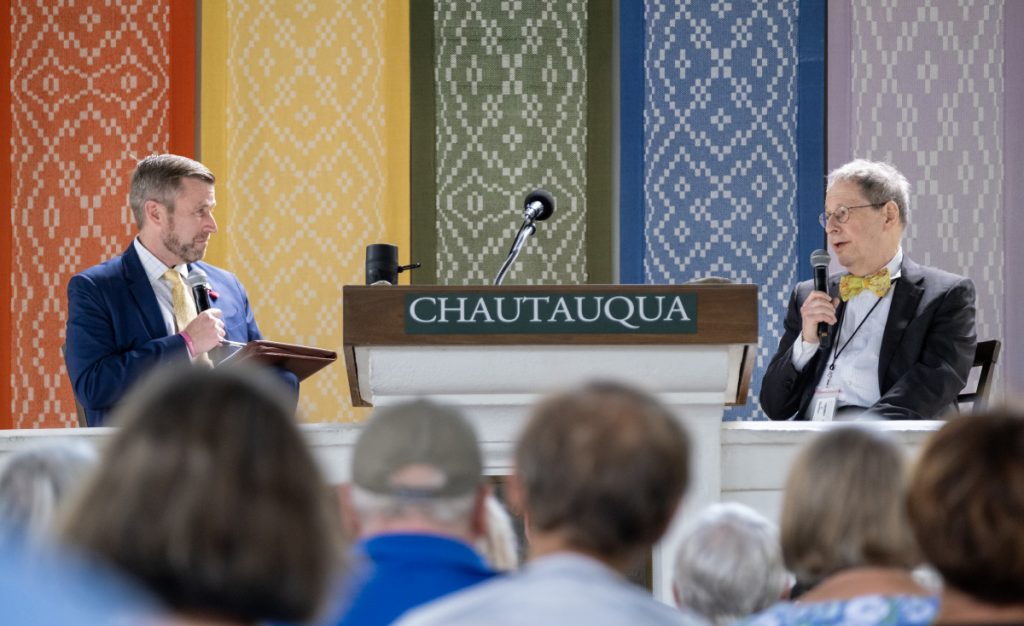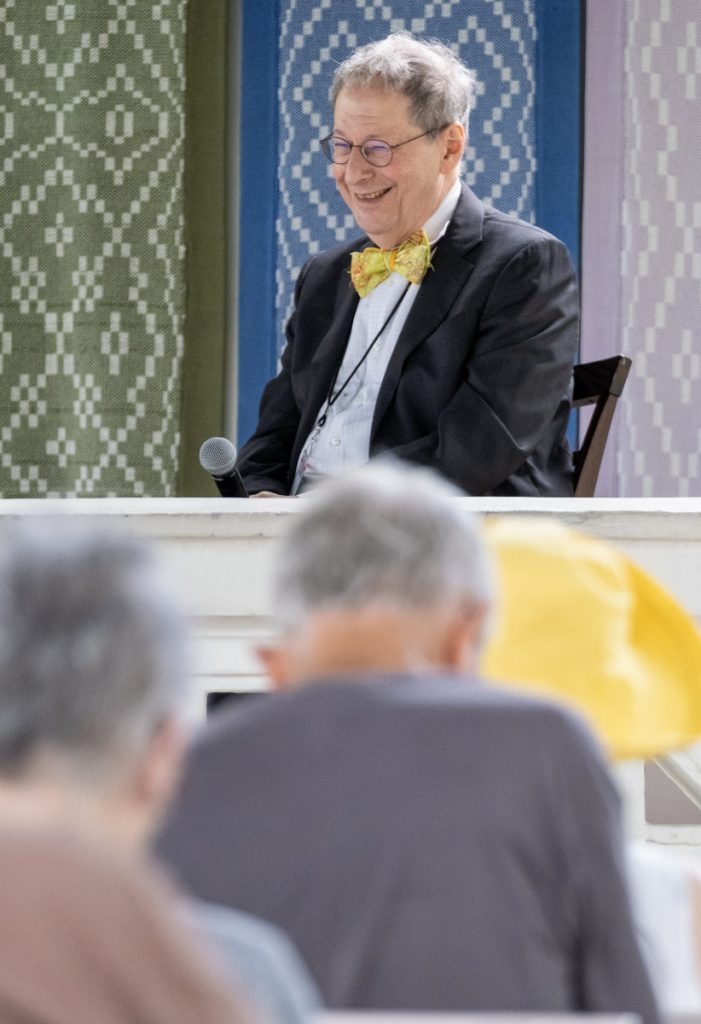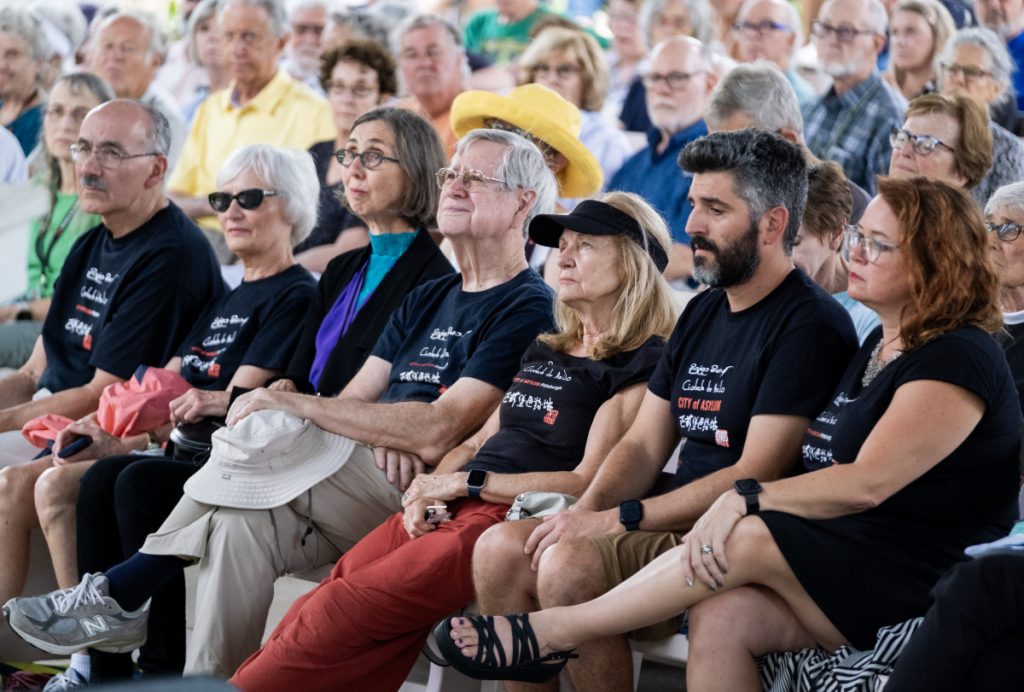
Alton Northup
Staff writer
On Aug. 12, 2022, Henry Reese, co-founder of City of Asylum in Pittsburgh, and prolific author Salman Rushdie were set to close Week Seven’s theme, “More than Shelter: Redefining the American Home,” with a discussion on persecuted writers – the lecture never happened after an attacker stormed the Amphitheater stage, injuring both men.
On the one-year anniversary of the attack, Reese sat down with Chautauqua Institution President Michael E. Hill to ensure Chautauquans were not robbed of that discussion. On Saturday afternoon in the Hall of Philosophy, the two reflected on the attack, the persecution of writers and the work of City of Asylum to support them. They were introduced by Sony Ton-Aime, the Michael I. Rudell Director of Literary Arts, who was also on stage with Reese and Rushdie that day.
In 1989, Iran Ayatollah Khomeini issued a fatwa calling for the death of Rushdie after he deemed the author’s book, The Satanic Verses, “blasphemous” and a misrepresentation of the Quran and Islam. The novel explores the stresses and transformations of Indian expatriates in England. Rushdie spent nearly a decade in hiding after the fatwa, which promised a bounty for his death, was issued.
In recalling the attack last summer, which left Rushdie without sight in one eye and the use of a hand, Reese said that, “it’s not just the material impact on him, which is obviously terrible, but it’s an attack on the imagination.”
It was this imagination that first inspired Reese and his wife Diane Samuels to create City of Asylum. Launched in 2004, the nonprofit organization based in Pittsburgh, Pennsylvania, provides exiled writers with financial support, medical coverage, short- and long-term housing, lawyers and the freedom to create.

Reese said he first met Rushdie through his books where he used rich imagery to portray what it means to not only lose one’s home but to plant new roots themselves. This struggle stood at the forefront of Reese and Samuels’ minds when starting City of Asylum.
“If all we do is put the person back into another dangerous situation or just a migratory life without the ability to continue, we can’t accomplish our purpose,” Reese said. “So, we began to think about how do we build a community around a writer?”
The first writer-in-residence at City of Asylum was Huang Xiang, a Chinese poet and calligrapher. The Chinese government first arrested Xiang in 1979 after he founded The Enlightenment Society, the country’s first underground writer’s society, according to PEN America. By the time he arrived at City of Asylum in 2004, Xiang’s works had been banned in China, and he served 12 years in prison.
“He was not allowed to publish,” Reese said. “He began to perform on streets so they broke his mouth in terrible ways so that he couldn’t actually perform in public. So, when he came he wanted to celebrate his freedom.”
Xiang initially said he wanted to carve a poem into a mountain; ultimately, he settled for painting one on the facade of his Pittsburgh rowhouse. Titled “House Poem,” the work has become a neighborhood icon and inspired City of Asylum to decorate all seven of their artist homes with written artwork.
The exiled writers were creating a culture themselves. The next step was to connect them with the new Pittsburgh culture. When a resident arrives, one of the first things the organization does is translate previous works by the artist into English.
“It’s critically important to restore the character of being a writer,” Reese said. “You’ve lost your identity – language is your identity.”

He said it is particularly important to support exiled literary writers because their works outlive political power and controversy, often making them the target themselves.
“Writers themselves are threatened, endangered, wiped out – it’s very different to say a book can’t be circulated, than (to say) a writer is now going to be killed,” Reese said. “In effect, we’re talking about the imagination itself being the target.”
To restore the autonomy of City of Asylum residents, all writers and artists complete a full-length work during their stay. Reese said while the impact of this on the residents is hard to describe, he can feel them be “reborn.”
City of Asylum is in a Pittsburgh neighborhood known as the Mexican War Streets, named for generals and battles from the Mexican-American War. On the corner of Sampsonia Way, a fence made not of chainlink, but handwritten letters, lines the Alphabet Reading Garden.
In 1994, Rushdie wrote a piece for The Independent on the nature of writers to resist barriers. Titled “Declaration of Independence for Those Without Frontiers,” Rushdie wrote: “Writers are citizens of many countries: the finite and frontiered country of observable reality and everyday life, the boundless kingdom of the imagination, the half-lost land of memory, the federations of the heart which are both hot and cold, the united states of the mind (calm and turbulent, broad and narrow, ordered and deranged), the celestial and infernal nations of desire, and – perhaps the most important of all our habitations – the unfettered republic of the tongue.”
Reese said if their discussion happened one year ago, he would have asked Rushdie “what he thought it was to be grounded himself, and after all these experiences in life – the threats, the movements from country to country – where he felt at home.”




